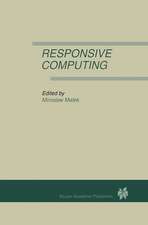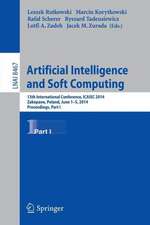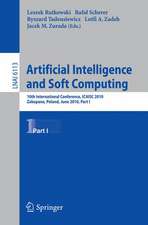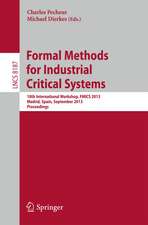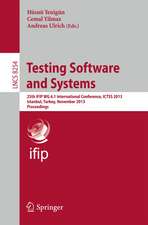Multiple Fuzzy Classification Systems: Studies in Fuzziness and Soft Computing, cartea 288
Autor Rafał Schereren Limba Engleză Paperback – 18 iul 2014
The present book discusses the three aforementioned fields – fuzzy systems, rough sets and ensemble techniques. As the trained ensemble should represent a single hypothesis, a lot of attention is placed on the possibility to combine fuzzy rules from fuzzy systems being members of classification ensemble. Furthermore, an emphasis is placed on ensembles that can work on incomplete data, thanks to rough set theory.
.
| Toate formatele și edițiile | Preț | Express |
|---|---|---|
| Paperback (1) | 638.04 lei 6-8 săpt. | |
| Springer Berlin, Heidelberg – 18 iul 2014 | 638.04 lei 6-8 săpt. | |
| Hardback (1) | 642.65 lei 6-8 săpt. | |
| Springer Berlin, Heidelberg – 28 iun 2012 | 642.65 lei 6-8 săpt. |
Din seria Studies in Fuzziness and Soft Computing
- 20%
 Preț: 999.85 lei
Preț: 999.85 lei - 20%
 Preț: 653.06 lei
Preț: 653.06 lei - 20%
 Preț: 872.98 lei
Preț: 872.98 lei - 20%
 Preț: 930.57 lei
Preț: 930.57 lei - 20%
 Preț: 1051.00 lei
Preț: 1051.00 lei - 20%
 Preț: 992.44 lei
Preț: 992.44 lei - 20%
 Preț: 655.85 lei
Preț: 655.85 lei - 20%
 Preț: 1001.86 lei
Preț: 1001.86 lei - 18%
 Preț: 954.14 lei
Preț: 954.14 lei - 20%
 Preț: 330.10 lei
Preț: 330.10 lei - 20%
 Preț: 333.04 lei
Preț: 333.04 lei - 20%
 Preț: 997.56 lei
Preț: 997.56 lei -
 Preț: 391.61 lei
Preț: 391.61 lei - 20%
 Preț: 647.79 lei
Preț: 647.79 lei - 20%
 Preț: 986.01 lei
Preț: 986.01 lei - 18%
 Preț: 958.56 lei
Preț: 958.56 lei - 20%
 Preț: 996.40 lei
Preț: 996.40 lei - 20%
 Preț: 999.35 lei
Preț: 999.35 lei - 15%
 Preț: 646.43 lei
Preț: 646.43 lei - 20%
 Preț: 651.57 lei
Preț: 651.57 lei - 20%
 Preț: 997.89 lei
Preț: 997.89 lei - 15%
 Preț: 641.03 lei
Preț: 641.03 lei - 20%
 Preț: 1009.74 lei
Preț: 1009.74 lei - 20%
 Preț: 992.62 lei
Preț: 992.62 lei -
 Preț: 388.72 lei
Preț: 388.72 lei - 18%
 Preț: 1223.43 lei
Preț: 1223.43 lei - 20%
 Preț: 651.42 lei
Preț: 651.42 lei - 18%
 Preț: 951.59 lei
Preț: 951.59 lei - 18%
 Preț: 948.61 lei
Preț: 948.61 lei
Preț: 638.04 lei
Preț vechi: 797.55 lei
-20% Nou
Puncte Express: 957
Preț estimativ în valută:
122.10€ • 132.59$ • 102.57£
122.10€ • 132.59$ • 102.57£
Carte tipărită la comandă
Livrare economică 22 aprilie-06 mai
Preluare comenzi: 021 569.72.76
Specificații
ISBN-13: 9783642436574
ISBN-10: 3642436579
Pagini: 144
Ilustrații: XII, 132 p.
Dimensiuni: 155 x 235 x 8 mm
Greutate: 0.21 kg
Ediția:2012
Editura: Springer Berlin, Heidelberg
Colecția Springer
Seria Studies in Fuzziness and Soft Computing
Locul publicării:Berlin, Heidelberg, Germany
ISBN-10: 3642436579
Pagini: 144
Ilustrații: XII, 132 p.
Dimensiuni: 155 x 235 x 8 mm
Greutate: 0.21 kg
Ediția:2012
Editura: Springer Berlin, Heidelberg
Colecția Springer
Seria Studies in Fuzziness and Soft Computing
Locul publicării:Berlin, Heidelberg, Germany
Public țintă
ResearchCuprins
Introduction to fuzzy systems.- Ensemble techniques.- Relational modular fuzzy systems.- Ensembles of the Mamdani fuzzy systems.- Logical type fuzzy systems.- Takagi-Sugeno fuzzy systems.- Rough–neuro–fuzzy Ensembles for Classification with Missing Data.- Concluding remarks and challenges for future research.
Textul de pe ultima copertă
Fuzzy classifiers are important tools in exploratory data analysis, which is a vital set of methods used in various engineering, scientific and business applications. Fuzzy classifiers use fuzzy rules and do not require assumptions common to statistical classification. Rough set theory is useful when data sets are incomplete. It defines a formal approximation of crisp sets by providing the lower and the upper approximation of the original set. Systems based on rough sets have natural ability to work on such data and incomplete vectors do not have to be preprocessed before classification. To achieve better performance than existing machine learning systems, fuzzy classifiers and rough sets can be combined in ensembles. Such ensembles consist of a finite set of learning models, usually weak learners.
The present book discusses the three aforementioned fields – fuzzy systems, rough sets and ensemble techniques. As the trained ensemble should represent a single hypothesis, a lot of attention is placed on the possibility to combine fuzzy rules from fuzzy systems being members of classification ensemble. Furthermore, an emphasis is placed on ensembles that can work on incomplete data, thanks to rough set theory.
The present book discusses the three aforementioned fields – fuzzy systems, rough sets and ensemble techniques. As the trained ensemble should represent a single hypothesis, a lot of attention is placed on the possibility to combine fuzzy rules from fuzzy systems being members of classification ensemble. Furthermore, an emphasis is placed on ensembles that can work on incomplete data, thanks to rough set theory.
Caracteristici
Novel approach for exploratory data analysis with ensembles of various neuro-fuzzy systems Derivation of various ensemble architectures that are able to work with missing data Written by an expert in this field



